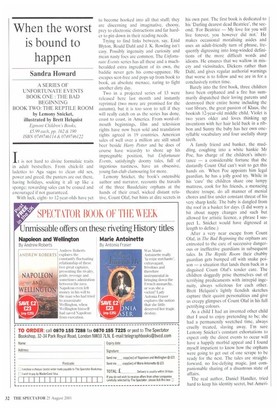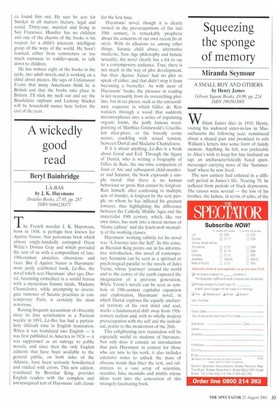When the worst is bound to happen
Sandra Howard
A SERIES OF UNFORTUNATE EVENTS BOOK ONE : THE BAD BEGINNING BOOK TWO: THE REPTILE ROOM by Lemony Snicket, illustrated by Brett Helquist Egmont Children's Books, £5.99 each, pp. 162& 190 ISBN 0749746114 & 0749746122 It is not hard to divine formulaic traits in adult bestsellers. From chick-lit and ladettes to Aga sagas to clean old sex, power and greed, the punters are out there, having holidays, soaking it all up like a sponge; rewarding sales can be coaxed and encouraged if not guaranteed.
With luck, eightto 12-year-olds have yet to become hooked into all that stuff; they are discerning and imaginative, choosy, prey to electronic distractions and far harder to pin down in their reading needs.
Trying to find links between, say. Enid Blyton, Roald Dahl and J. K. Rowling isn't easy. Possibly ingenuity and curiosity and mean nasty foes are common. The Unfortunate Events series has all these and a muchheralded extra ingredient of its own, the baddie never gets his come-uppance. He escapes scot-free and pops up from book to book, an absolute menace, raring to fight another dirty day.
Two in a projected series of 13 were released here last month and instantly reprinted (two more are promised for the autumn), but it is too soon to tell if they will really catch on as the series has done, coast to coast, in America. From word-ofmouth beginnings, film and television rights have now been sold and translation rights agreed in 19 countries. American sales of well over a million are still small beer beside Ham: Potter and he does of course have wizardry to shore up his impregnable position, but Unfortunate Events, satisfyingly doomy tales, full of ingenious nastiness, have an obsessive, young fan-club clamouring for more.
Lemony Snicket, the book's ostensible author and narrator, recounts the travails of the three Baudelaire orphans at the hands of their cruel, wicked distant relative. Count Olaf, hut hints at dire secrets in his own past. The first book is dedicated to his 'Darling dearest dead Beatrice', the second, 'For Beatrice — My love for you will live forever, you however did not.' He makes occasional moralising asides and uses an adult-friendly turn of phrase, frequently digressing into long-winded definitions of the more difficult words and idioms. He ensures that we wallow in misery and vicissitudes, Dickens rather than Dahl, and gives regular authorial warnings that worse is to follow and we are in for a conclusively rotten time.
Barely into the first book, three children have been orphaned and a fire has summarily dispatched their loving parents and destroyed their entire home including the vast library, the great passion of Klaus, the bookish 12-year-old middle child. Violet is two years older and loves thinking up inventions with her hair held back in a ribbon and Sunny the baby has her own onesyllable vocabulary and four usefully sharp teeth.
A family friend and banker, the muddling, coughing into a white hankie Mr Poe, has charge of the children's inheritance — a considerable fortune that the dastardly Count Olaf can't wait to get this hands on. When Poe appoints him legal guardian, he has a jolly good try. While in his 'care' the children share one lumpy mattress, cook for his friends, a menacing theatre troupe, do all manner of menial chores and live under constant threat of his very sharp knife. The baby is dangled from the roof in a basket for days. (I did worry a bit about nappy changes and such but allowed for artistic licence, a phrase I suspect L. Snicket would have digressed at length to define.) After a very near escape from Count Olaf, in The Bad Beginning the orphans are entrusted to the care of successive dangerous or ineffective guardians in subsequent tales. In The Reptile Room their chubby guardian gets bumped off with snake poison — a situation that lands them back in a disguised Count Olafs tender care. The children doggedly prise themselves out of terrifying predicaments with intrepid ingenuity, always solicitous for each other. Brett Helquist's lightly fiendish sketches capture their quaint personalities and give us creepy glimpses of Count Olaf in his full petrifying colours.
As a child I had an invented other child that I used to enjoy pretending to be; she had a permanently wretched time, always cruelly treated, slaving away. I'm sure Lemony Snicket's constant exhortations to expect only the direst events to occur will have a happily morbid appeal and I found myself impatient to know how the orphans were going to get out of one scrape to be ready for the next. The tales are straightforward, no foe-defying magic, just companionable sharing of a disastrous state of affairs.
The real author, Daniel Handler, tried hard to keep his identity secret, but Amen ca found him out. He says he acts for Snicket in all matters literary, legal and social. Thirty-one, married and living in San Francisco, Handler has no children and one of the charms of the books is his respect for a child's innocent, intelligent grasp of the ways of the world. He hasn't learned, either from remoteness or too much exposure to toddler-speak, to talk down to children.
He has written eight of the books in the cycle, two adult novels and is working on a third about pirates. He says of Unfortunate Events that many Americans think he is British and that the books take place in Britain. I'll stick my neck out and say the Baudelaire orphans and Lemony Snicket will be household names here before the end of the year.



























































 Previous page
Previous page